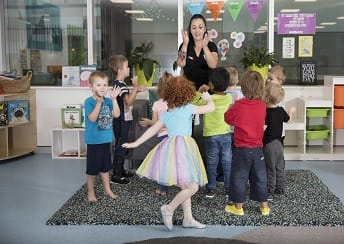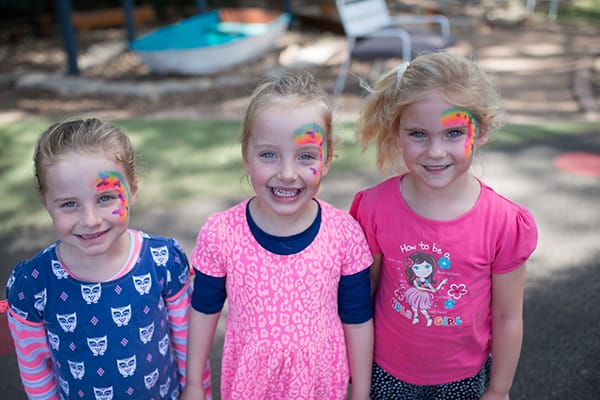Why attending an early childhood service more than one day benefits your child
Early childhood education and care services cater for the educational and care needs of children birth-5 years. Over the past decade, increased levels of evidence-based research demonstrate that children who attend a high-quality early education and care service, experience better learning, well-being and behavioural outcomes.1 Furthermore, early education and care service enhances children’s short-term and long term developmental outcomes, prepares them for life long learning and is an important investment into their future.
What does ‘high quality’ early education mean?
As a parent determining what is a ‘high quality’ education and care service can be overwhelming, however there are a number of features that should be considered when choosing a service that suits the needs of your family unit. Families’ should consider the following;
- Service visits are important. Ensure that the teachers and educators value and promote genuine parent partnerships in order to support your child’s learning.
- The service provides a high quality curriculum. Early childhood curriculums are based on play-based learning theories, which means learning occurs through play. Furthermore, the learning environments need to ensure that they will support the learning and development of children by providing play-based opportunities for children to explore, develop their curiosity and creativity, to develop social relationships, stimulate a sense of well-being.2
- Staff qualifications– Research indicates services that employ high quality teachers and educators that have the knowledge, skills and expertise to deliver an educational program that is diverse, equitable and stimulating, equate to children making more progress and better social/behavioural gains compared to those attending a low-quality service.3 Also, parents/carers need assurance that their children are respected, safe and opportunities to socially connect with others.
- Approved provider. A quality service must be approved and display their approval. In Australia, all early childhood education and care services are assessed for quality against a set of National quality standards. Each service is rated accordingly, with the top rating being exceeding, then meeting, then working towards and lastly, significant improvement.4
What benefits could be associated with your child attending more than one day?
Nearly one quarter of Australian children arrive at school without the foundational skills required, that is, showing significant vulnerabilities in their knowledge, communication, social skills, emotional well-being and physical health.3 Research nationally and internationally confirms that children enrolled in high-quality early education and care services have lasting developmental effects and numerous benefits, which include;
- The duration of attendance is important with every month of preschool after 2 years linked to higher cognitive/ intellectual development, improved levels of independence, higher concentration and enhanced social skills.3
- Children attending a ‘high quality’ service, result in significant improvements in language, numeracy, social and emotional development at the age of 7 years.5
- Literacy and numeracy benefits according to longitudinal studies are still evident at 11 and 16 years for those children who attended high quality early childhood services.5
- Research indicates that children need a minimum of 15 hours per week, 40 weeks per year or 600 hours per year, in early childhood education and care services as the minimum ‘dosage’ required for long-term effectiveness.3
- Studies confirm that higher frequency of positive, sensitive and involved educational and care experiences for infants and toddlers relates to higher attachment security between educators and children, therefore enabling them to settle.6
- Research on infants and toddlers suggested increased time in high quality education and care services can increase children’s engagement levels as they become more sociable, peer oriented and increasingly active-both verbally and physically.7
Evidence based research therefore suggests, that there are long term social, emotional, cognitive and language benefits for children who have the opportunity of attending high quality education and care programs and for long duration periods. Children transitioning into early education and care services, that have more time (at least two days), will assist in a smoother process, and enable them to reach their fullest potential as suggested by the research presented.
Sources:
- Siraj, I., Melhuish, E. C., Howard, S., Neilsen-Hewett, C., Kingston, D., de Rosnay, M., & Luu, B. (2017). Fostering Effective Early Learning (FEEL) Study-Final Report.
- Department of Education, Employment and workplace Relations (DEEWR) (2009) Belonging, Being and Becoming- The Early Years Learning Framework for Australia, Department of Education, Employment and workplace Relations, Australia.
- Fox, S and Geddes, M. (2016). Preschool – Two Years are better than one: Developing a Preschool Program for Australian 3 Year Olds – Evidence, Policy and Implementation, Mitchell Institute Policy Paper No. 03/2016. Mitchell Institute, Melbourne. Available from: mitchellinstitute.org.au
- Australian Children’s Education and Care Quality Authority, https://www.acecqa.gov.au/assessment/assessment-and-rating-process
- Sylva, K., Melhuish, E., Sammons, P., Siraj-Blatchford, I., & Taggart, B. (2004). The effective provision of pre-school education (EPPE) project: Final Report: A longitudinal study funded by the DfES 1997-2004.
- Datler, W., Ereky-Stevens, K., Hover-Reisner, N., & Malmberg, L. E. (2012). Toddlers’ transition to out-of-home day care: Settling into a new care environment. Infant Behavior and Development, 35(3), 439-451.
- Howes, C., Rodning, C., Galluzzo, D. C., & Myers, L. (1988). Attachment and child care: Relationships with mother and caregiver. Early childhood research quarterly, 3(4), 403-416.



